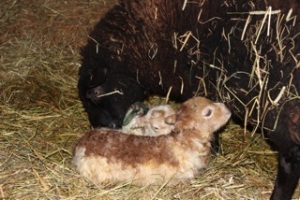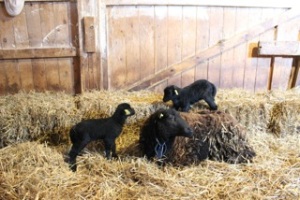I’ve spent the night nursing a very sick Black Welsh ewe who recently had two lambs. This morning I made a dash into Charlottetown for lamb milk replacer and medications in an attempt to save her and her lambs. In all of North America there are only five living White Welsh Mountain sheep and this ewe is the mother of two of them. Hence the desperate attempt to save her.
After medicating her with antibiotics, anti-inflammatory pain medication and some glucose rich liquid, her eyes brightened and she was up on her feet. I felt she had a fighting chance, so I made arrangements for her to go to UPEI for IV fluids and possible surgery.
Next, a batch of warm milk replacer was mixed up for the lambs. Then the fun began. Teaching lambs to drink from a bowl after being only on the udder can be a bit of an adventure. The bigger lamb caught on fairly quickly and I was only partially drenched in milk replacer, but the smaller lamb was quite a battle. Afterward, I looked like I’d had a bath in it, with only a small amount ending up in the lamb’s tummy. The lambs will mind their mother being away terribly, but at least they have been handled a lot and now they do not mind being picked up. I will have to remember to add some live culture yogurt to their diet, as they have been exposed to antibiotics.
Well, off their mother went in the UPEI trailer. The sad end of the story was that the vet called after examining her and determined her chances were not good. Treatment would be very uncomfortable and unlikely to save her and it was recommended that she be put down. Rest in peace Elissa the ewe.



